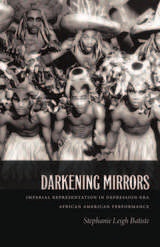Sites of Slavery: Citizenship and Racial Democracy in the Post–Civil Rights Imagination
Duke University Press, 2012
Cloth: 978-0-8223-5242-6 | eISBN: 978-0-8223-9186-9 | Paper: 978-0-8223-5261-7
Library of Congress Classification E185.615.T575 2012
Dewey Decimal Classification 326.0973
Cloth: 978-0-8223-5242-6 | eISBN: 978-0-8223-9186-9 | Paper: 978-0-8223-5261-7
Library of Congress Classification E185.615.T575 2012
Dewey Decimal Classification 326.0973
ABOUT THIS BOOK | AUTHOR BIOGRAPHY | REVIEWS | TOC | REQUEST ACCESSIBLE FILE
ABOUT THIS BOOK
More than forty years after the major victories of the civil rights movement, African Americans have a vexed relation to the civic myth of the United States as the land of equal opportunity and justice for all. In Sites of Slavery Salamishah Tillet examines how contemporary African American artists and intellectuals—including Annette Gordon-Reed, Barbara Chase-Riboud, Bill T. Jones, Carrie Mae Weems, and Kara Walker—turn to the subject of slavery in order to understand and challenge the ongoing exclusion of African Americans from the founding narratives of the United States. She explains how they reconstruct "sites of slavery"—contested figures, events, memories, locations, and experiences related to chattel slavery—such as the allegations of a sexual relationship between Thomas Jefferson and Sally Hemings, the characters Uncle Tom and Topsy in Harriet Beecher Stowe's novel Uncle Tom's Cabin, African American tourism to slave forts in Ghana and Senegal, and the legal challenges posed by reparations movements. By claiming and recasting these sites of slavery, contemporary artists and intellectuals provide slaves with an interiority and subjectivity denied them in American history, register the civic estrangement experienced by African Americans in the post–civil rights era, and envision a more fully realized American democracy.
See other books on: Citizenship | Memory | Racial Democracy | Sites | Slavery
See other titles from Duke University Press



























